La fausse esclave is an opéra comique in one act by Christoph Willibald Gluck. Its French-language libretto based on Louis Anseaume and Pierre-Augustin Lefèvre de Marcouville's libretto for La fausse aventurière, an opéra comique by Jean-Louis Laruette. It was first performed on 8 January 1758 at the Burgtheater in Vienna. The full score is lost, but a keyboard version is extant.

Cyrano de Bergerac is a four-act opera with music by Franco Alfano, and libretto by Henri Caïn, based on Edmond Rostand's 1897 drama Cyrano de Bergerac.

Hans Heiling is a German Romantic opera in 3 acts with prologue by Heinrich Marschner with a libretto by Eduard Devrient, who also sang the title role at the première at the Königliche Hofoper, Berlin, on 24 May 1833. From there, the work went on to become Marschner's most successful opera. The opera brought the composer a considerable reputation, although this did not materially affect his position in Hanover, where he was music director of the Court Theatre. Like Marschner's other great success, Der Vampyr, the plot of Hans Heiling makes great use of supernatural elements. As with several of his operas, Hans Heiling is based on a folk legend.
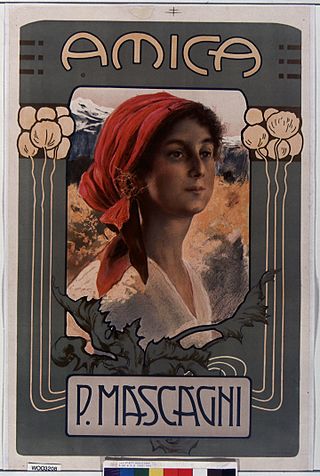
Amica is an opera in two acts by Pietro Mascagni, originally composed to a libretto by Paul Bérel. The only opera by Mascagni with a French libretto, it was an immediate success with both the audience and the critics on its opening night at the Théâtre du Casino in Monte-Carlo on 16 March 1905. Mascagni himself conducted the performance. The opera had its Italian premiere on 13 May 1905 at the Teatro Costanzi in Rome.

Pygmalion is a monodrama in one act by composer Georg Benda with a German libretto by Friedrich Wilhelm Gotter. The opera's first performance was at the Ekhof Theatre, the court theatre in Gotha, on 20 September 1779. Pygmalion was the fourth of the five theatrical collaborations of Benda and Gotter. Gotter based his text on Jean-Jacques Rousseau's 1762 play Pygmalion. Benda's melodrama is unusual as it has no singing roles. Two of the three characters, Pygmalion and Galatea, are spoken roles; the other, Venus, is silently acted on stage.
Gennaro Astarita was an Italian composer, mainly of operas. The place of his birth is unknown, although he was active in Naples for many years. He began his operatic career in 1765, collaborating with Niccolò Piccinni in the writing of the opera L'orfana insidiata. He became the maestro di cappella in Naples in 1770.
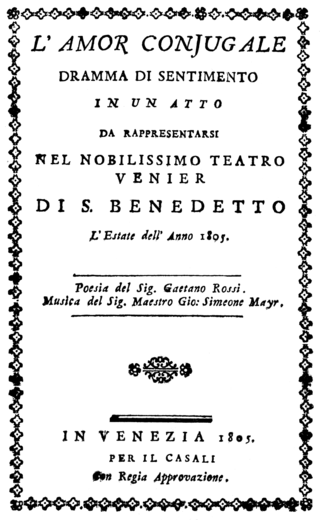
L'amor coniugale is an opera in one act by Simon Mayr set to an Italian libretto by Gaetano Rossi. It premiered at Padua's Teatro Nuovo on 26 July 1805.
Ginevra di Scozia is an opera in two acts by Simon Mayr set to an Italian libretto by Gaetano Rossi based on Antonio Salvi's Ginevra, principessa di Scozia, which in turn was adapted from cantos 5 and 6 of Ludovico Ariosto's Orlando Furioso. Ginevra di Scozia premiered on 21 April 1801 at the Regio Teatro Nuovo in Trieste to celebrate the inauguration of the new theatre. The story is virtually identical to that of Handel's Ariodante which shares the same source for the libretto.
Pinotta is an idillio or opera in 2 acts by Pietro Mascagni from an Italian libretto by Giovanni Targioni-Tozzetti. The opera received its first performance on 23 March 1932 at the Teatro del Casinò in San Remo.

Antonio Cagnoni was an Italian composer. Primarily known for his twenty operas, his work is characterized by his use of leitmotifs and moderately dissonant harmonies. In addition to writing music for the stage, he composed a modest amount of sacred music, most notably a Requiem in 1888. He also contributed the third movement, Quid sum miser, to the Messa per Rossini, a collaborative work created by thirteen composers to honor Gioacchino Rossini.
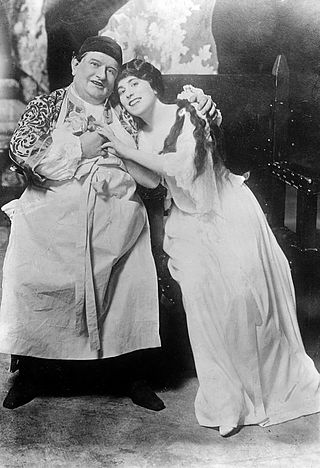
L'amore medico is an opera in two acts by composer Ermanno Wolf-Ferrari. Based on Molière's comedy L'Amour médecin, the work uses an Italian language libretto by Enrico Golisciani. It premiered in a German version by Richard Batka on 4 December 1913 at the Hoftheater in Dresden under the title Der Liebhaber als Arzt.
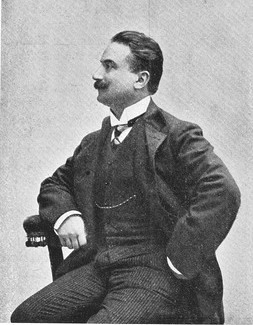
Gaetano Coronaro was an Italian conductor, pedagogue, and composer. He was born in Vicenza and had his initial musical training there followed by study from 1871 to 1873 at the Milan Conservatory under Franco Faccio. He composed orchestral works, sacred music, and chamber pieces as well as five operas. La Creola, which premiered at the Teatro Comunale di Bologna in 1878, was the only one to have any success.
Il trionfo di Clelia, Wq. 31, is an opera composed by Christoph Willibald Gluck. It takes the form of a dramma per musica in three acts. The Italian-language libretto by Pietro Metastasio is based on several semi-legendary narratives concerning the founding of the Roman Republic. The opera premiered on 14 May 1763 at the Teatro Comunale di Bologna. Although rarely performed since then, it was revived in London in 2012 at the Royal Opera House's Linbury Studio.
Vincenzo Michetti was an Italian composer.
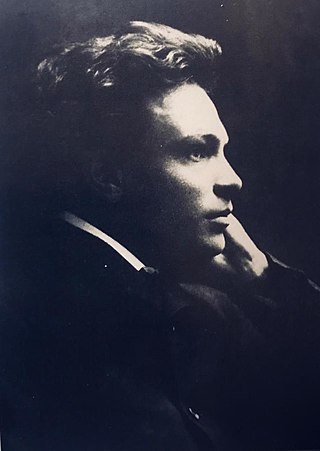
La bella dormente nel bosco is an opera in three acts by Ottorino Respighi to a libretto by Gian Bistolfi based on Charles Perrault's fairy tale "Sleeping Beauty".

Maria Carbone was an Italian operatic soprano. She created the lead female roles in two of Gian Francesco Malipiero's operas: the title role in Ecuba and Cleopatra in Antonio e Cleopatra.
Nitocri is an opera in two acts composed by Saverio Mercadante to libretto by Apostolo Zeno adapted by Lodovico Piossasco Feys. The libretto is a fictionalised account of the Egyptian queen Nitocris. The opera premiered at the Teatro Regio in Turin on 26 December 1824.
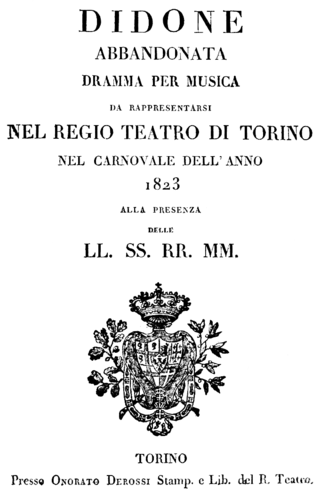
Didone abbandonata is an 1823 opera in two acts by Saverio Mercadante to a libretto by Andrea Leone Tottola after Metastasio's Didone abbandonata. It was first performed on 18 January 1823 at the Teatro Regio in Turin.
Les femmes vengées, ou Les feintes infidélités is a one-act opéra comique by François-André Danican Philidor to a libretto by Michel-Jean Sedaine after Jean de La Fontaine's "Les rémois" from the third part (1671) of his collection of ribald short stories, Contes et nouvelles en vers. It was first performed on 20 March 1775 at the Comédie-Italienne (Hôtel de Bourgogne, Paris.











